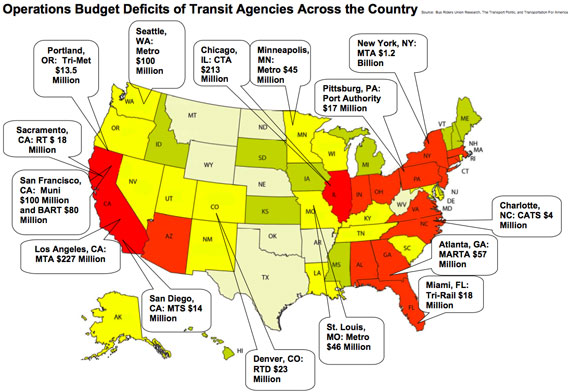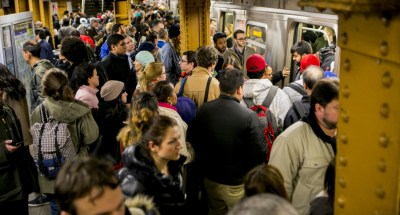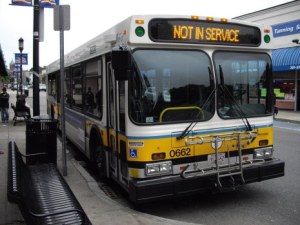Advocating for a Transpo Bill That Keeps Transit Riders Moving
 Large cities continue to grapple with big gaps in their transit budgets. Graphic: Transit Riders for Public Transportation.
Large cities continue to grapple with big gaps in their transit budgets. Graphic: Transit Riders for Public Transportation.Advocates in cities across the country are mobilizing today to support increased federal funding for transit service. Transit Riders for Public Transportation (TRPT), a national coalition focused on bringing "environmental justice and civil rights priorities to the upcoming federal surface transportation act," is calling on representatives in the House to co-sponsor H.R. 2746, which would allow transit agencies to spend more of their federal funds on day-to-day operations.
Transit agencies are still reeling from declining tax revenues brought on by the recession, with fare hikes and service cuts on tap in dozens of cities. The stimulus bill has provided little help. An amendment to fund transit operations was shot down back in January.
H.R. 2746, sponsored by Rep. Russ Carnahan, a Democrat from St. Louis, would allow transit agencies in large cities like New York to spend up to 30 percent of their federal funding on operations. For cities with less than a million residents, the percentage would be higher. By comparison, representative James Oberstar’s draft transportation bill would limit the amount agencies in large cities can spend on operations to five percent.
"[Five percent] falls far too short to cover the magnitude and depth of the transit operation crisis happening across the country," said James Burke of West Harlem Environmental Action (WEACT), one of TRPT’s members in New York City. Transit agencies are currently permitted to spend 10 percent of their stimulus funds to keep trains and buses running (thanks to a rider attached to the latest war funding bill), and they still have yawning gaps in their operating budgets.
H.R. 2746 is a "marker" that could eventually be incorporated into the House transportation bill. It has 42 co-sponsors, with Michael McMahon and Anthony Weiner the only representatives from the five boroughs to have signed on so far. To gain more support in the House, WEACT and other local advocates are targeting the New York City delegation, especially Transportation and Infrastucture Committee member Jerrold Nadler, whose voice carries a lot of weight on transit issues.


